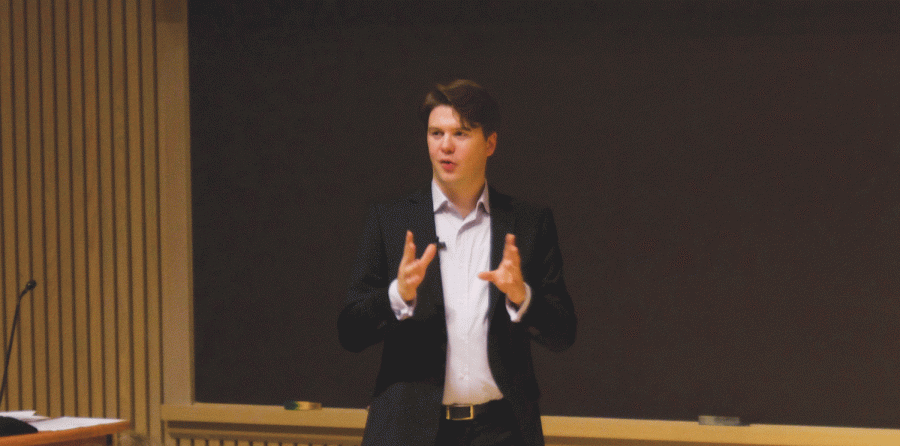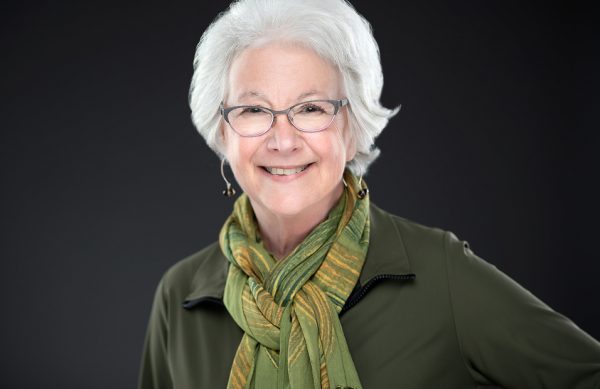Antoine Bousquet Talks the Evolution of War
Organizers of Colgate’s Peter C. Schaehner Memorial Lecture annually elect a speaker that they feel embodies the spirit of the eponymous Colgate alumnus who dedicated his life to promoting peace and resolving conflict. Graduating in the heart of the Vietnam War, Schaehner witnessed innumerable deaths, some of close friends, as well as the political and social turmoil surrounding the war and its evolution. His work to end violent wars such as these and work toward global peace lives on through these lectures and the dedicated drive of those pioneers in their fields who are invited to speak.
In the ninth year since its conception, the lecture selected Antoine Bousquet to deliver “The Disappearance of the Battlefield and the ‘End of War’” on Thursday, October 5. Senior Lecturer in International Relations for Birkbeck, University of London, Bousquet holds heavy influence in modern discourse about the adaptations of warfare and its implications for peace and future conflict. Most notably, his book, The Scientific Way of Warfare: Order and Chaos on the Battlefields of Modernity, has influenced the discussion in many university classes, including Colgate’s, revolving around peace and conflict.
The lecture, made all the more engaging by Bousquet’s British lilt, focused on the transformation of formal war and its manifestations, specifically the battlefield. War, originally a personal prerogative of national leaders, often pertained to land disputes and was declared with relative frequency. A battlefield was a designated space, away from citizens, for fighting until a winner was declared under a limited time frame. Modern nation-states seldom declare war (the U.S. last officially declared war in 1942), now relying on prolonged conflicts sanctioned by government movement of troops. These new conflicts focus less on physical resources and more often than not on ideological differences (e.g. “The War on Terror”). The battlefield of modern war often blurs the line between citizens and soldiers and loses its temporal element, often lacking a clear start date and lasting for decades until a government decides to withdraw its forces.
These evolutions in warfare seem, on the surface, to be beneficial. As Bousquet puts it, they appear to indicate that “war is coming to its conclusion.” The amount of soldier casualties has drastically decreased. Battles are no longer large events of concentrated carnage and loss. But in fact, conflict has only changed its form, not fully disappeared. The drop in casualties does not account for the increase in surviving soldiers with war-caused disabilities. The concentrated battlefield has disseminated into a global one where citizens, rather than soldiers, are often the targets. We have entered an age of milder, perpetual conflict that maintains a hollow guise of peace. War and the battlefield may have disappeared in their conventional sense, but have only returned with new methods of universal deployment, Bousquet explained.
The latter half of the lecture oriented itself toward the future of conflict that it is no longer waged against a group but singular people or entities. The battlefield is expanding to a global scale but also pinpointing itself to any country or region where specific people are staying. With advancements in technology, the consequences of war are becoming impersonal and less understood. No risk is taken by a soldier flying a drone and targeting people in the safety of a control unit. When a virtually insignificant amount of lives are lost on one’s own side of fighting, the risk and therefore incentive not to fight, loses value. War becomes easier to start and maintain with little consequence on the side of the more technologically advanced, and should be a wary fact of continuing in conflict.
Though focused on the evolution of war and conflict, Bousquet fell short in providing any answers to how we can adapt and attempt to maintain peace and end conflict within this changing system. He admitted that it is too recent for answers to be found, and that we are constantly looking for way to engender peace, in the tradition of Schaehner, even if it has not yet been found.
Contact Andrew Kish at [email protected].




